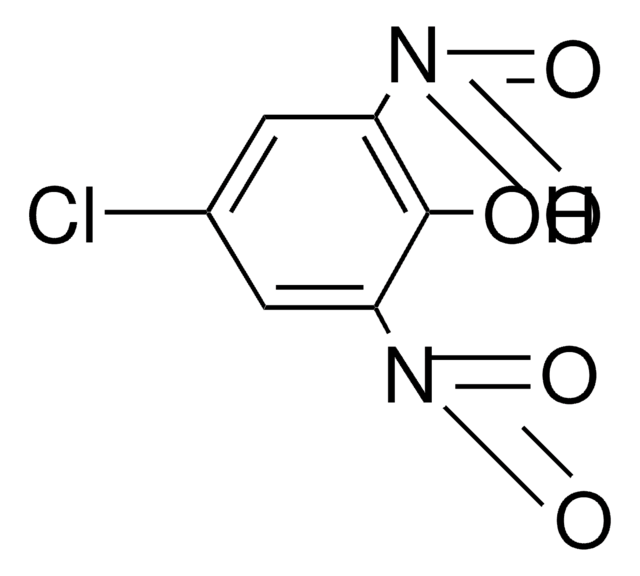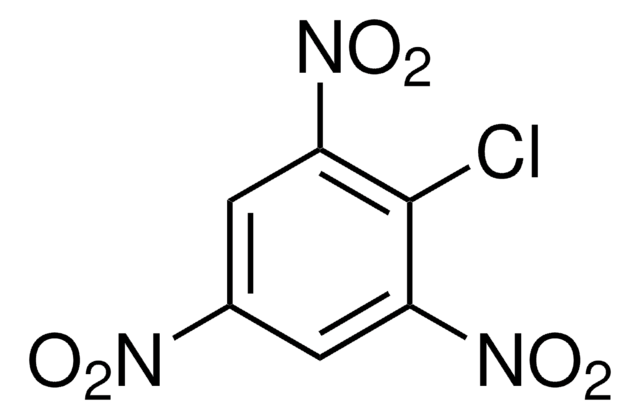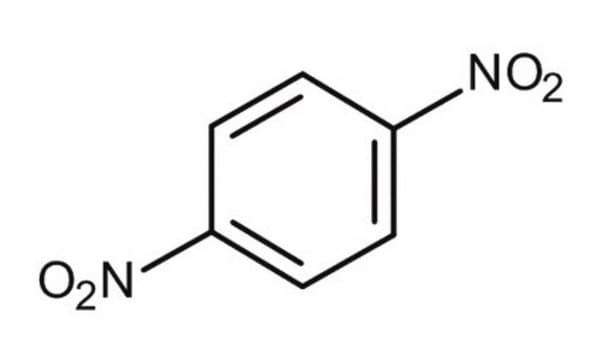All Photos(1)
About This Item
Empirical Formula (Hill Notation):
C6H3ClN2O5
CAS Number:
Molecular Weight:
218.55
EC Number:
MDL number:
UNSPSC Code:
12352100
PubChem Substance ID:
NACRES:
NA.22
Recommended Products
Quality Level
Assay
97%
mp
110-114 °C (lit.)
SMILES string
Oc1c(Cl)cc(cc1[N+]([O-])=O)[N+]([O-])=O
InChI
1S/C6H3ClN2O5/c7-4-1-3(8(11)12)2-5(6(4)10)9(13)14/h1-2,10H
InChI key
PCBCIXWBAPIVDV-UHFFFAOYSA-N
General description
2-Chloro-4,6-dinitrophenol was added as nitrogen, carbon and energy supplement in the culture medium of Rhodococcus erythropolis HL 24-1.
Application
2-Chloro-4,6-dinitrophenol was used in identification of components in chemical waste water and in effluents from biological wastewater treatment plant using electrospray ionization and tandem mass spectrometry.
Signal Word
Warning
Hazard Statements
Precautionary Statements
Hazard Classifications
Eye Irrit. 2 - Skin Irrit. 2 - STOT SE 3
Target Organs
Respiratory system
Storage Class Code
11 - Combustible Solids
WGK
WGK 2
Flash Point(F)
Not applicable
Flash Point(C)
Not applicable
Personal Protective Equipment
dust mask type N95 (US), Eyeshields, Gloves
Certificates of Analysis (COA)
Search for Certificates of Analysis (COA) by entering the products Lot/Batch Number. Lot and Batch Numbers can be found on a product’s label following the words ‘Lot’ or ‘Batch’.
Already Own This Product?
Find documentation for the products that you have recently purchased in the Document Library.
H Lenke et al.
Applied and environmental microbiology, 62(3), 784-790 (1996-03-01)
Rhodococcus erythropolis HL 24-1 isolated as a 2,4-dinitrophenol-degrading organism can utilize 2-chloro-4,6-dinitrophenol as the sole nitrogen, carbon, and energy source under aerobic conditions. This compound is metabolized with liberation of stoichiometric amounts of chloride and nitrite. Under anaerobic conditions, 2,4-dinitrophenol
B M Hughes et al.
Journal of the American Society for Mass Spectrometry, 4(7), 604-610 (1993-07-01)
Highly polar, non-gas-chromatographable compounds have few unambiguous analysis protocols for environmental applications. A recent environmental investigation, concerning the identification of a non-gas-chromatographable yellow component in chemical waste water and in effluents from a biological wastewater treatment plant required the use
Our team of scientists has experience in all areas of research including Life Science, Material Science, Chemical Synthesis, Chromatography, Analytical and many others.
Contact Technical Service








